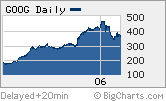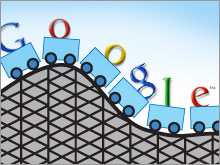|
Google's latest goof
Shares slip after search engine discloses that certain slides presented on the Web during its analyst meeting shouldn't have been there.
NEW YORK (CNNMoney.com) - Search engine Google disclosed in a filing with the Securities and Exchange Commission late Tuesday that statements about sales projections were inadvertently posted on the company's Investor Relations Web site during its analyst day presentation on March 2. The company said in the filing that slides showing that Google expected revenue to grow from $6 billion in 2005 to $9.5 billion this year and that profit margins in its AdSense business would "be squeezed in 2006 and beyond" were part of notes prepared during the fourth quarter of 2005 for an internal strategy presentation and were erroneously included in a slide accompanying the analyst day Webcast. Google added that the sales figures should not be construed as financial guidance and that comments about profit margins do not "reflect Google's current expectations." What we have here, is a failure to communicate
The company's disclosure snafu is the latest in a series of problems that the company has had communicating with Wall Street. Shares plunged last week after chief financial officer George Reyes said in a presentation at a Merrill Lynch Internet conference that growth in the company's core business of search-based advertising was starting to slow. The company later clarified that statement to say that it still saw "significant opportunities" for revenue growth. Google also said in Tuesday's filing that comments about the company's stock-based compensation charges for 2006 should not have been included in the presentation. But Google said that the information in that particular slide, namely that the company would need to take a charge of $342 million related to stock awards granted to employees and directors prior to this year, was "materially accurate." The popular search engine company famously has refused to provide any revenue or earnings guidance to Wall Street since going public in August 2004. Analysts, however are predicting that Google will generate sales of $6.6 billion in 2006 and sales of $9.2 billion next year. Those numbers exclude traffic acquisition costs, or revenue that the company shares with affiliate partners such as AOL, the Internet unit of Time Warner (Research) that Google has purchased a 5 percent stake in for $1 billion. (Time Warner also owns CNNMoney.com.) Shares of Google (Research), which fell about 1 percent in regular trading on the Nasdaq Tuesday, slipped more than 2 percent in after-hours trading. Room for growing pains?
One analyst called Google's slide goof a "boo-boo" but added that it was not something that would have a major impact on the company going forward. "It's a standard mistake made by a company that's newly public, but because it's Google, of course everything is magnified," said John Tinker, an analyst with ThinkEquity Partners. "The company is on a learning curve and they are beginning to realize they are not operating under the radar anymore." Still, Google's mishap comes at an inopportune time for the company. Google's stock has tumbled more than 15 percent since the company reported fourth quarter earnings in late January that were below analyst expectations. Shares now trade at nearly 25 percent below their all-time high from early January. The company sought to reassure investors and analysts during its presentation last week that it still saw healthy growth opportunities in search and that it was also looking to expand into new areas of online advertising as well as other aspects of the traditional media business. Nonetheless, investors are worried about increased competition that Google is facing from the likes of Yahoo! (Research), Microsoft's (Research) MSN and the revamped Ask.com, owned by IAC/InterActive (Research). Analysts have also expressed concerns about how much Google's capital expenditures for 2006. The company has said that it plans to invest heavily this year in order to roll out new products and services and that has some investors worried about the impact this spending will have on profits. Google has also come under attack for cooperating with the Chinese government and agreeing to censor certain search results on its Chinese Web site and for refusing to hand over information about random searches that the U.S. government has asked for in order to use to try and revive a child online pornography law. With all these risks in mind, some on Wall Street have begun to question whether or not Google is worth its premium stock price; shares trade at more than 40 times 2006 earnings estimates. Is too much or too little information about Google's growth hurting the stock? Click here for more.
For a look at why Google is on the defensive, click here. |
|




